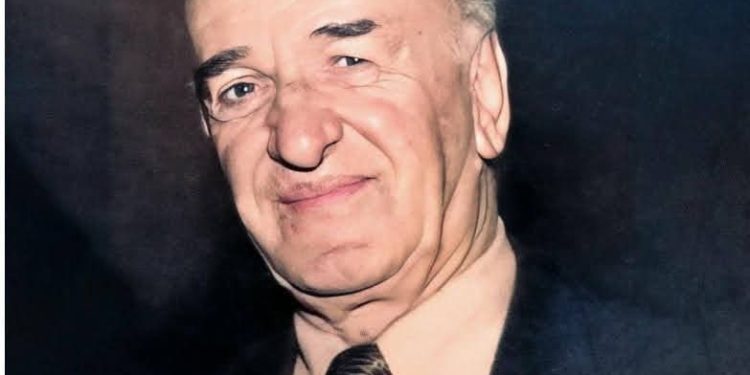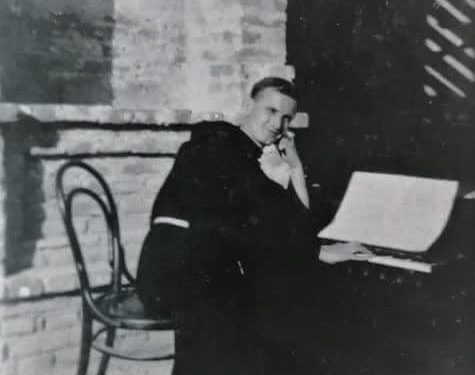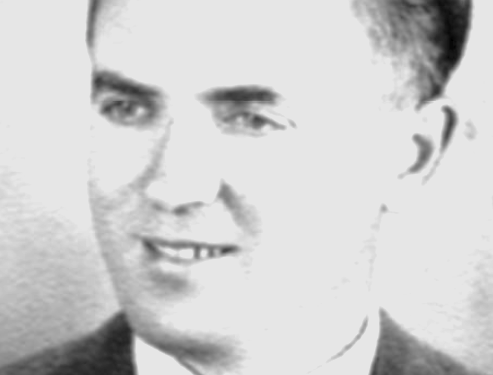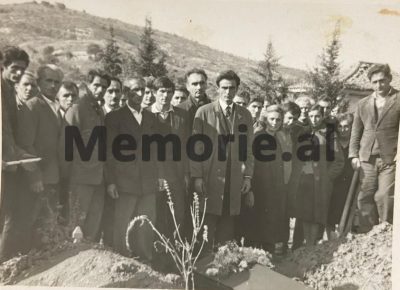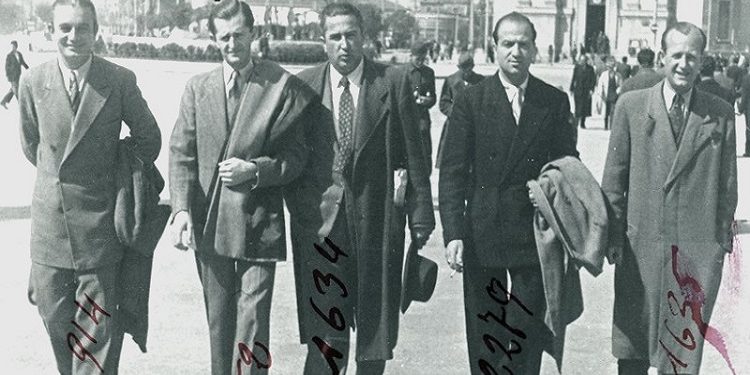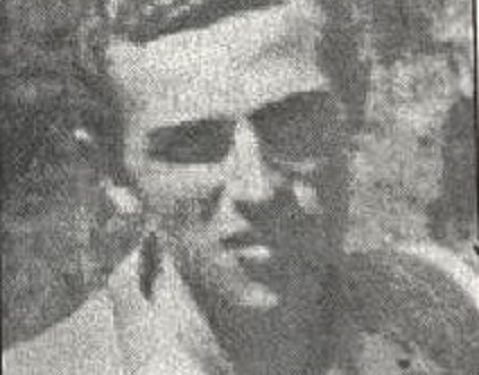By Ahmet Bushati
part forty-seven
Memorie.al/ After the flag was altered in 1944 with the addition of the communist star, Shkodra transformed into a center of resistance against the regime, paying a high price for its tradition of freedom. By April 1945, high school students, already feeling betrayed by the promises of the war, gathered to oppose the new terror that imprisoned and killed innocent people. Communism turned Kosovo into a province of Yugoslavia, while Shkodra was punished for its “historical crime”- its defiance against invaders. The “Postriba Movement” became a tool to suppress all dissent, plunging the city into an unprecedented spiral of suffering: imprisonments, executions, and the destruction of families. The high school students, alongside citizens, became symbols of resistance, while some “young communists” turned into tools of the State Security, leading to expulsions, imprisonments, and internments.
Four times, Shkodra rose in armed rebellion, but history forgot these battles. This book is written to remember the countless prisoners, the tortured, the killed, and the parents who suffered in silence. It is a warning against dictatorship and a plea for future generations not to forget the sacrifices made for freedom.
Continued from the previous issue
In the Footsteps of a Diary
During all that time, the policemen would not be left alive. Apparently, most of them had their own worries, preparing for an unannounced departure, sharing with their families and with Shkodra their “happiness”, which most of them had never even dreamed of. After a few hours of chaos and emotion, after lunch, the prison, somewhat tired and sad, would fall naturally into an uncomfortable silence, waiting for the final signal for departure, a signal that once came from a herald, would shout from below the courtyard: “Those whose names have been called, come out with all their belongings”.
As we were leaving the room, we noticed how some prisoners, out of emotion, tried to greet us with as few words as possible and helpless smiles, which of course impressed us as we were leaving, but even more touching would be the moment when, before we passed through the two iron gates, to finally emerge into the large courtyard, we would turn our gaze towards the windows filled with indistinguishable faces of prisoners who wished us; “Have a good journey, have a good journey”! While us, as loudly as we could, would repeat several times in a row: “Goodbye, goodbye”! The impression I had as I passed from the prison to the courtyard was that it seemed to me that our departure was taking away the energy and life that that prison had and that we were leaving that prison in emptiness and coldness.
In the large courtyard of the prison we would wait for many hours, until around midnight we heard the cars coming to a stop on the road, somewhere beyond the surrounding wall of its large courtyard. One after the other we were loaded into the wooden bodies of Russian cars of the “Zis” brand, where we were tied together in tight rows, in order to prevent any possibility of escape. At the corner of each body, there would be two policemen. A car full of policemen in front of the convoy and another also full of policemen behind. Last would come the cars with our belongings, with three or four policemen on them. At the moment the signal for departure was given and, when the roar of all the engines starting up the convoy brutally broke the deep silence of the night, our eyes from afar discerned in the darkness the silhouettes of people, who began to move like shadows somewhere ahead.
They had been relatives of prisoners, who, after having awaited our departure for several hours, were emerging from the recesses where until then they had been sheltered from the cold of the night, as well as from the fear of policemen or possible spies. When our car, which was the last in line, was turning the “Parruca” turn, we saw small groups of women – who were not always clearly visible – looking in our direction, not daring to even raise a hand to greet us, while very soon I and the others would hear the full voice of a woman walking parallel and very close to our car who, in a full voice, said: “Have a good trip, son, I’ll take the bad ones”! I, who happened to be leaning on the back of the car, immediately raised my head and saw that the woman who had just spoken was tall and dressed in black, and that she was continuing to walk, supposedly doing her job.
We would later learn that this woman had been Kolë Kurti’s mother. If you don’t leave these moments with great emotions for our families, whose lives the dictatorship was barbarically playing with, precisely on this occasion, one of my sisters would write to me a few days ago: “It was late; we returned home and stayed in the veranda until the cars started moving. Çescu’s wife was also staying with us that night. As soon as we felt the cars starting, we all burst into tears, until even Mina – father – could no longer hold back”!
We had not yet left “Parrucet”, when, noticing from afar our people who were escorting us at that late hour, and taking advantage of the fact that the policemen accompanying us in the cars were not the strict ones from the prison, but others brought just for that occasion, our car began to sing, “Porsi fleta e ejllit’ Zotot”, and other patriotic songs in succession, until the exit of “Baçallek”, from where then, having left Shkodra immersed in darkness and deep silence, we ourselves, tired as we were from standing for so long and a day loaded with so many emotions, would fall into silence for a moment. Bajram Xhemaliu, who was close to me, would occasionally wake me up and say: “Ahmet, let’s jump, let’s jump,” something I never agreed to, considering that in that case, my family would be deported.
The cars moved slowly and sometimes stopped to make contact with each other. The light dawned on us at the entrance to Fushë-Krujë and when I unintentionally turned my head back, my eyes would suddenly meet those of Qemali, the good policeman, who a year and a half earlier, because of me, had been removed from service in the Security. At first he noticed me attentively, but for fear of being seen by others, he quickly turned his head the other way. So we passed Durrës and Kavajë, and when we had also passed Peqin, the cars soon abandoned the main road and, winding to the left along an unpaved road that climbed the side of a low hill, at the end of which it would not be long before a camp surrounded by barbed wire would appear to us, when we would finally understand our destination.
Bono Bridge Camp
Even before we got out of the cars, we noticed that at every corner of the camp there was a lookout tower, on top of which stood a policeman with a machine gun in the direction of the camp. Inside the barbed wire fence, ordinary barracks were arranged in a system, covered with boards and covered with tar paper. The day was cloudy and there was a possibility that it had rained there during the night, because the ground inside the camp seemed to be immersed in mud. Many prisoners had approached the wire fence, demanding to know which prison we were in. The prisoners of Tirana, as well as those of Durrës, Vlona and Gjinokastra, would repeatedly affirm that their desire had always been to be in the same camp as the prisoners of Shkodra.
Opposite the prisoner camp and at a distance of about 40-50 meters, the camp command was located on a slightly higher ground than the prisoners, and next to it, the complex of barracks for the police and part of their families. This camp would be called the Bono Bridge, having taken its name from a place where the Shkumbin River crossed, and where a large bridge for the railway had been built, here and there for which we would carry out very voluminous earthworks. The prisoners’ bunkers were built on a surface of earth, inside which there ran from beginning to end a corridor also made of earth, to the right and left of which there would be two low floors of layers of boards, on which, like figs in rows, the prisoners’ pillows would extend by about 0.7-0.8, each one.
The prisoners were organized into three large brigades, within which, as in the army, there would be several companies, which would also consist of several squads with their respective commanders, as well as a police officer in charge. Generally, the number of prisoners in a camp was around 2,000 people. In the first brigade where I was assigned, as comrades from the Shkodra prison, I would have Hilmi Kamata, Çesk Gjeluci, Gjovalin Zezaj, Ahmet Kopliku, Myhit Bushati, as well as several others, with whom the camp was getting to know me for the first time, such as Kolë Kurti, Dedë Gjo Marku, Zef Mirdita, priests Father Gardini, Father Dioniz Maka, – who stood out for being strong at work – Father Filip Mazrreku – who had degraded his artistic inclination to retouching earth slopes when some prisoners failed to give them the necessary slope shapes – Dom Injac Gjoka, – who built bridges more than any other priest and who only the harassment of Uncle (Hilmi Kamata, as he would be called by the elders of the camp), would keep him from melting gas, so much so that out of pleasure, he would even throw his hand on his neck, as was not his habit.
In a brigade with us would also be Dodë Nushi and his brother, from the village of Rragam, my friends who would constantly stand out as very good and courageous people. On this occasion, I must also mention a strong and fiery boy from Lumet, a certain Asllan Sulet, a friend of ours and a little older than me, who, before he had grown up, had taken up the rifle behind Muharrem Bajraktari, and about whom I can say that even without having been in the war, his bravery was proven. His older brother, Muhamet, also a prisoner, had a different nature. Whenever we visited him in the country, he would impress us greatly with his friendly yet measured attitude, perhaps reminding us in some ways of the men of tradition.
From the Tirana prison there we would meet the charming dentist from Durrës, Hasan Jera, who was serving as a sanitary attendant in that camp with a bag on his shoulder. Years earlier he had finished in Paris and after the first prison of five years, he would go back to prison, and would spend his life inside, not leaving there, except on the eve of the victory of democracy and precisely about six months after his wife, who had waited and loved him for so long, had died.
Also from the Tirana prison, in that brigade we would meet Atif Toptan, who had probably graduated in agronomy; pharmacist Hasan Meniku, together with his nephew Mas’har, a former footballer for the Tirana team, as well as other younger intellectuals, such as the brothers Asllan and Tomor Ypi, Felatu and Zafer Vila, Genc Pojani, Haki Karapici, who had graduated in law, as well as journalists Beqir Ajazi and Koço Semini, who as a former student of the Technical School had once been editor-in-chief of its newspaper “Laboremus”. In a brigade with us would also be the student from Durrës, Balto Vlashi, who worked together with Genc Previzi, son of Preng Previzi, who was said to have crossed the border with Greece dressed as a general.
In this brigade of ours there would also be former officers Gjon Llambushi and Ali Çiftja, the first from Shkodër and the other from Elbasan, who would come together, as well as Gjon Kacaroci with a small body and always smiling, to whom the sun made his red brick shine more than a mirror. Hajro Plaku, son-in-law of Dan Hasan, an exceptionally good and peaceful man, was also part of our brigade. Among others, there would also be a man with the surname Frashëri, who probably had the name Andon, with a wide literary culture, who had lived for some time in Boston, America and where, having been especially connected with Noli, among other things, he would tell me how Noli respected Konica very much and how he, Noli, had constantly found strength and inspiration for his writings in the glass of wine. We had some from the Burrel prison, but I am not the least mentioning Ylber Starova, who must have been somewhat older than me.
In the second brigade, where we had friends like Injac Serreqin, Gjon Kovaçin, Viktor Kujxhina and Çesk Hilgega, there were also Shkodra residents from the Tirana prison, like Myfit Myrto Bushati and Hamdi Hoti, and like them, other young ballistas, like Petrit Toto, Islam Lleshi, Teufik Gabrani, Niko Qirko, Ylli Selenica, Burim Kokoshi and others. With the latter, perhaps, I connected more than with the others, for a kind of romanticism with which he, as a very idealist that he was, was accompanying the many days of prison. When autumn approached, the time when we would separate to return after the prisons, Burimi, who had heard about the imprisonment of other students in the city of Vlora, would tell me: “I have my mind on the young students that I will meet in the Vlora prison, and I don’t know when that day will come”! I, for my part, also held the joyful idea that when we returned to the Shkodra prison, I would find young students from the former Bardhosh Dan group, about whom we had heard that they had been sentenced during those days.
In that second brigade, there also happened to be the former Tirana student, Petrit Berisha, a very charming young man, with strong monarchist convictions, who would go to prison for the rest of our lives. Even in the third brigade, there were many people from Shkodra, but I can only remember a few, like our friends; Remzi and Xhevat Quku, Rrok Pali, Maliq Teta and then the older ones, like Maliq Bushati, Qamil Nikshiqi, Xhevat Meta and Ruzhdi Çoba, who were from the same family; as well as Father Donat Kurti, Xhevat Dani, Zef Toni, a man who was a bit withdrawn, but extremely correct and objective about everything and very dear to those who were close to him, like me and others. That brigade also included Zija Çausholli, Shyqyri Shpuza, Xhelë Baci and Ramadan Drishti, who sometimes even laughed at us socially. From that brigade, I remember a serious man from Gjinokostra named Sami Koka, who as a soldier had the rank of colonel.
Also a certain Skënder Kuqit from Kruje, a couple of charming and somewhat funny men, named Ramazan Tabaku from Tirana and Ram Marku from Shijak, who had been very rich and who had helped the National Liberation War like no other. These two were constantly in a good mood and their conversations were always mocking and loud, they would be heard from one of our bunkers. In that brigade, from Berat was Teufik Çepelja and many, many others, from the south and the north, whom I remember by figures, but not by names, for the long time that has passed and which, in the end, do not in all cases serve the purpose of this work. In that camp also happened to be the powerful nephew of Namik Xhelili, Myfit Shehu, who sometimes wrote poetry.
The works were directed by imprisoned engineers, such as the tyrant Abdulla Muça and former students and masters who had graduated from Fultz’s school, such as Stavri Bojaxhiu, Mark Dindi, and Namik Xhelili – who, although from Vlona,remained a staunch legalist. There was also another with the surname Merlika, who managed the maintenance of the wagons with which the soil was transported as well as some mechanisms.
As camp commander we had Lieutenant Tasi Marko, brother of Rita Marko, already a member of the “Bureau” and close to Enver Hoxha. Although this Tasi, as long as he was our commander, would behave well, his name was associated with the horrors of the Vloçisht camp, of the two years before, of which he had been commander. Just like Rita with her position and name, Tasi, they would not know a thing from a thing and go where the wind blows. When it came to Tasi, the prisoners would mockingly say: “one lighter, one in the ear, one who twists it”, by which we meant Tasi, who would always be seen twisting a cigarette, even though someone else had it in his ear, except for a third who would always have it turned on.
Inside the camp we also had an internal commander, a prisoner, who, unlike those of the brigades, was called a general, namely a certain Hamdi Lenet from Mallakastret who, after having been the head of the Sigurimi in Korça, had killed his fiancée out of jealousy. Around this somewhat secretive person who did not want to expose himself too much, they brought the spies he led, who, without exception, were ordinary people. Our first brigade had as its commander a certain Kamber Backet, a scrapper, who in Shkodra had been a police chief with the rank of captain and who, as far as I remember, had been imprisoned for his association with the nationalist Mestan Ujani, one of the most prominent fighters during the War for the Berat area, declared an enemy of the rear by Enver Hoxha.
A day or two after us, my father had also set off for Peqin, loaded with food and some loot for us. The night had fallen in the small town of Peqin, where life outside had died down since the early hours of the evening. In front of a bar that was about to close, where my father had taken a seat, a large man, dressed in a suit and a high hat, had passed by, who had asked my father: “Where are you from?” and “What brings you here?” After my father had explained that he was coming from Shkodër, following a son who was imprisoned somewhere beyond Peqin that generous man had managed, after much opposition from my father, to take my father to his house.
Starting from this incident and onwards, throughout all the years of my imprisonment and forever, a great friendship would be established between us with this man named Ramazan Bica and his house. During the three years that I would be camping in the Peqin area, the house of Ramazan Bica, a butcher by profession, would welcome my people who would follow me back with food. The friendship between our two families was so strong that my people would be invited to their married daughters in Kavaja, Rrogozhina and Lushnje, as well as to some of their friends and relatives. If ever the people of my house broke the rule of coming with food for three or four days, Ramazan Bica would send a telegram with a reply to Shkodra, to find out the reason for their not coming on time.
Despite the deep misery of life and the harshness of the class struggle that was being developed with cruelty at that time, under the instigation and control of the government, the character and the white Albanian heart would not be abandoned by many individuals and houses, one of which would be that of the Brisqes from Shirq on the Buna Coast, and as in the past, would continue to maintain respect and friendship for my house, and one of its sons, Ymeri, having had him who several times, loaded with food for me, would accompany my father or mother, together with one of my sisters, to the distant camps of Ura Vajgurore, Vlashuk, Berat and Shtyllas in Fier. Likewise, whenever during the four years in the camps my people brought me food, along with they would regularly be 500 lekshi from Zade, the mother of the baker Ali Hoxha, at Çinari.
Also, how many drivers did they have that certain families of prisoners would regularly inform about the day when they would set off for Berat, Burrel, etc., where those families had their own people in prison or camp, just as there were also vendors who, a day or two before they put out pasta, cheese or other things for sale, would secretly inform our families, so that they would then line up at night.
In the first two months in this camp, our work and life had their own difficulties, among which are the cold at night that came in through the poorly sealed boards of the silos, as well as the rain that sometimes prevented us from working and, above all, the insufficient food, especially in relation to the work that we had to do. Although the demand for the fulfillment of the norm would be constantly serious and constant, the treatment by the command was quite lenient, the lenientest in the entire history of my camps.
In the morning, before dawn, they would give us semolina soup, a dish that I had never even heard of, had never even heard of. At lunch, it was hearty, sometimes with a small piece of meat, and at dinner, tea that tasted like sourdough from the very little sugar it contained. Sometimes this tea was accompanied by a piece of strong marmalade. Initially, they also gave us ten eggs a month, to stop after a while. The bread ration fluctuated, from 700-800 grams, for the prisoner.
The insufficient food compared to the high energy consumption required to achieve a high standard had led some prisoners, especially the ordinary ones, to take up hunting for turtles, which, during working hours, they would search for and find in the bushes where they hid, or in the riverbed, where they had to go to drink water. These prisoners would then be seen somewhere behind the sheds after lunch, cooking those turtles in two green zinc pots, shaped like deep square plates. There were times when one of them would feel ashamed, if he were caught off guard by the unexpected passing of a friend or a stranger, and as if to justify his impatience, he would say: “There’s nothing wrong, absolutely nothing, her meat is just like chicken meat”!
Hajdar Kollaku, probably from the villages of Elbasan, a famous thief who did not try to hide his habit of stealing. Whenever he passed by our place, he would stop for a while and with his eternal humor, he would tell us about some of his “actions”, just as a man normally tells about the work he did for a living, and at the end of his short conversation, he would add: “Don’t be afraid of me, I won’t touch you”! One day, Hajdari had managed to catch a fox and proudly brought it to the camp, and after cutting it up, he would hang it in a visible place somewhere in the middle of the camp and skin it like a butcher skins a lamb. After cooking it, he would eat it in front of others and mock those who had told him that fox meat was supposedly like dog meat.
When spring came, we would, so to speak, breathe even more freely. The new acquaintances with many prisoners, the unrestricted movements around the camp until an hour or two after nightfall, the landscape itself with white houses, scattered here and there across the green hills with soft contours, which evoked such peaceful feelings in my soul, as well as the letters that arrived there daily and without hindrance from outside, had made us young people, at least, feel quite good and there were those who, comparing that camp to Vločisht and Bedeni, considered it “village life”. Only the sleeping bag would finally lock us in the sheds. The last to enter the silo would be Gjon Kovaçi, who, sometimes even after the last bell had rung, would listen to them imitating with a loud voice, from one corner of the silo to the other. Memorie.al
Continued in the next issue





